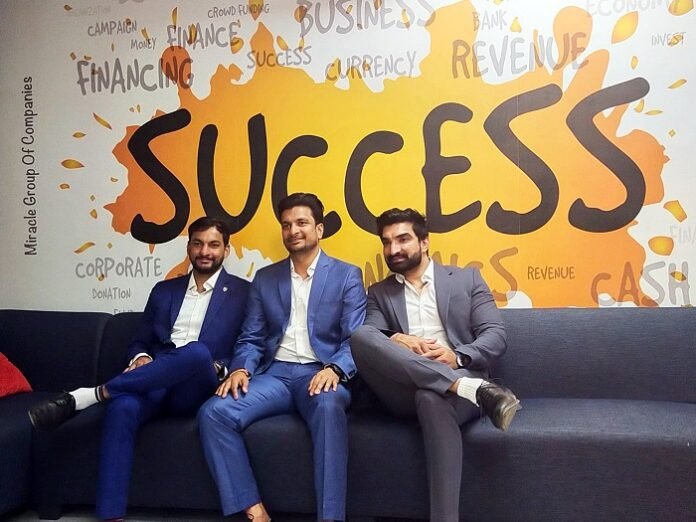
Jaipur-headquartered Miracle Group has announced that its capacity expansion in the current financial year will entail an investment of Rs 125 crore. The investments are across the eight plants of one of India’s fast–growing packaging companies, which produces mono, litho-laminated, corrugated and rigid cartons and boxes, labels, and rigid plastic containers, laminates, and pouches.
All the newly acquired machinery is being installed and commissioned within the second quarter of the current financial year. The investment is expected to upgrade Miracle’s overall production capacity by up to 30%. In the company’s Jaipur carton plant, a K&B Rapida 105 7-color plus coater press and a sheetfed gravure press are being installed.
In the converting section, two DGM Technocut 1050S die-cutters with stripping and front waste removal, a Smartfold 1100PC folder–gluer with semi-automatic collection, and a Technofold 1100PC folder-gluer with semi-automatic collection are being added. The new production line is scheduled to go live on 15 August.
In its other locations, the corrugation, label, and flexible packaging divisions are also undergoing upgrades, with full-scale execution and commissioning similarly scheduled by the end of September (Q2 FY 25-26). The Miracle group says it has averaged year-on-year growth of over 25% in the past five reported years and that it aims to grow by at least 20% annually, to become one of the top five packaging material suppliers in the country.
According to the company, the current expansion is part of a broader strategy to build a scalable, future-ready infrastructure supporting both domestic and global markets. The investments in technology, quality, and sustainability strengthen its position in the packaging sector.
In an interview with Packaging South Asia, Lokesh Agarwal, managing director – Sales & Marketing, Miracle Group, provides further details.
How is the ₹125 crore investment distributed across the different packaging segments and manufacturing units?
The ₹125 crore investment is being strategically deployed across all our manufacturing facilities, including corrugated boxes, monocartons, self-adhesive labels, flexible packaging (pouches & laminates), rigid boxes, shrink sleeves, and HDPE cans. The objective is to modernize infrastructure, expand capacity, and enhance our pan-India responsiveness. In addition, this investment includes setting up a solar park in Jaipur aimed at achieving carbon neutrality, underlining our commitment to sustainable growth.
What are the key end-use industries or clients driving the increased demand for your packaging solutions?
We are witnessing consistent growth across multiple sectors, driven by India’s strong consumption trends. The key demand drivers include FMCG (food, home, and personal care), eCommerce and retail, pharmaceuticals & healthcare, liquor and beverages, dairy and edible oils. There is demand also from fertilizers, electronics, white goods, lubricants, automotive, apparel, footwear, solar, and lifestyle brands.
Our integrated product portfolio and in-house innovation capabilities allow us to offer tailored packaging solutions across both high-volume and premium categories, with growing emphasis on sustainable and circular packaging.
How is Miracle integrating sustainability into its new infrastructure and machinery upgrades? Are there specific environmental targets tied to this expansion?
Sustainability is deeply embedded in our expansion and operational strategy. Key initiatives include 100% roof utilization for solar panels across plants; all facilities are Zero Liquid Discharge (ZLD); over 30% green-covered area in each facility; solar park set-up in Jaipur under progress to support carbon neutrality goals; natural sunlight is used during daytime operations to reduce power dependency; upgrading to high-energy efficient machinery, including the latest IE5 motors.
In our carton, plastic container, label, and flexible packaging production we are adopting design-for-recyclability principles. We are increasing the use of FSC-certified paperboards and approved-grade substrates and incorporating up to 70% post-consumer recycled (PCR) content in select flexible packaging materials.
We are optimizing laminate structures and shifting from multilayer to single-family barrier films for improved recyclability and substituting plastic packaging with paper-based alternatives where applicable and appropriate. In addition, we are adding plastic waste recycling capabilities for circularity and reducing emissions. We are targeting a 15–20% reduction in carbon and water footprint per ton of production over the next two years, in alignment with global ESG standards.
Are there any export markets that Miracle is actively targeting?
Yes, expanding into export markets is a key strategic priority for us. We are actively targeting global clients, particularly in flexible packaging, pressure-sensitive labels, and monocartons. Our investments in internationally compliant infrastructure show a strong focus on certifications such as BRCGS, SEDEX, and FSC to meet global sustainability and quality expectations.
With the Jaipur plant’s new folded carton line going live soon, what are your expectations in terms of capacity utilisation?
The new monocarton line at our Jaipur facility marks a major milestone. We expect a 20–25% capacity increase, serving regional clients in FMCG, pharma, and liquor segments.
We’re projecting 60-65% utilization in the first six months, with full capacity expected by the end of the next fiscal year. This line features state-of-the-art machinery with energy-efficient motors, offering faster turnaround times, superior print quality, and leveraging natural daylighting and solar power—contributing to both operational efficiency and environmental goals.










